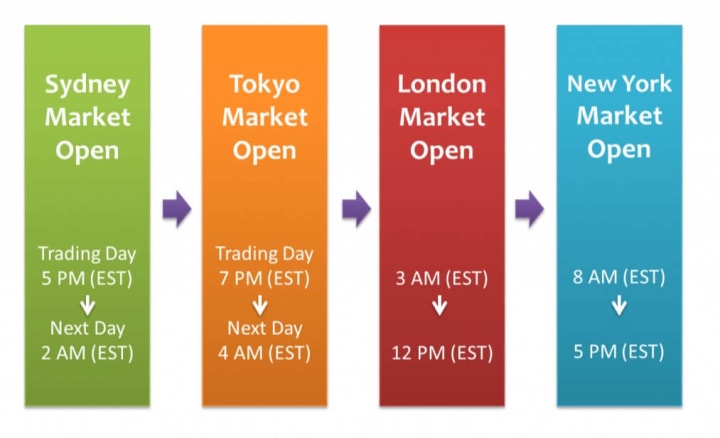How The Forex Market Opens 24/5 (And Why It’s Closed On Weekends)
Ever wondered how Forex is open 24/5 but closed on weekends? Here, you’ll discover these reasons and more about how the market operates.

One of the beautiful things about the forex market is its 24/5 structure. Unlike other markets, forex is open for the vast majority of the week. Aside from weekends and a few holidays, the forex market is always available for anyone to trade.
Besides retail trading on platforms, foreign exchange - whether by central banks for governments, commercial banks for their clients, or travelers swapping currencies - always occurs somewhere worldwide.
Forex transactions are efficient because of their decentralized nature. This means trading is independent of one single point of failure. Also, technology has eliminated physical structures as trading now happens electronically.
Such attributes make FX the most liquid financial security in the world. Studying these features is helpful by understanding how currency exchange occurs 24/5, the influence of forex being a decentralized instrument, and why no trading occurs on weekends.
The different forex trading sessions
The forex market is open 24 hours, five days a week. Official opening times are from 5 pm EST (Eastern Standard Time) on Sunday until 5 pm EST on Friday. During daylight savings periods in March, April, October, and November for some countries, these hours shift an hour up or down.
Although forex can occur any time during the open hours and each country has its trading hubs, the broader instrument is technically broken up into four major sessions: Sydney (Australia), Tokyo (Japan), London (England), and New York (America).
These zones represent the most liquidity, volatility, and trading power. Research suggests these times alone contribute to at least three-quarters of the daily volume.

- Sydney session opens between 5 pm and 2 am EST
- Tokyo session opens between 7 pm and 4 am EST
- London session opens between 3 am and 12 am EST
- New York session opens between 8 am and 5 pm EST
These periods are worth observing for traders, especially when they overlap. The London and New York session overlap is particularly noted for being the busiest, representing two of the largest currencies in action.
Overall, these specific sessions have slight spread widening as market makers expect an influx of traders to participate in anticipation of the increased volume.
High-impacting economic releases emerge around such periods, further adding to the higher speculative interest. Another observable time worth noting is the rollover, essentially the beginning of the Australian session.
Rollover refers to the interest swaps paid to or debited from a trader’s account for ‘rolling over’ or holding positions overnight. Traders must get to grips with these sessions and understand what generally occurs during those times.
The impacts of forex being a decentralized market
Although there are drawbacks to any decentralized market, this very fact is part of the incredible efficiency of foreign exchange. For instance, when the New York session is closed, anyone nearly anywhere on the planet can purchase or sell large quantities of US dollars to another trader or forex dealer or convert those dollars into their native money.
Trading is not conducted in one central place but instead distributed worldwide through ECNs (electronic communication networks). Also, the purposes of forex are diverse aside from retail speculators, who only form a tiny part of the entire market.
Banks (central and commercial), multinational corporations, hedge funds, etc., are massive participants using foreign exchange for numerous purposes aside from speculating. Such a diverse group has fostered a global network of dealers operating in multiple international time zones.
Why is the forex market closed on weekends?
Like most financial instruments, forex is closed on weekends as market makers only operate during conventional business hours. As briefly mentioned, large commercial banks are the vast contributors to most trading volume.
Therefore, the smaller section of the market cannot trade if most big traders are away. Any positions executed before the close will remain idle until the open.
Retail brokerages and liquidity providers catering to the ordinary trader have no incentive to provide market access. Some brokers like OANDA offered weekend trading long ago, but the infrastructure required to maintain this service incurred significant business costs.
From a trader’s perspective, trading during the weekend would bring about erratic price movements due to thinner liquidity, increasing spreads, and other trading costs.
Although the market might be closed for these two days, foreign exchange continues globally across numerous forex dealers. Prices remain consistent with little gaps when the market reopens on Sunday, 5 pm EST.
Such gaps may be substantially noticeable on rare occasions due to an unexpected fundamental event.
Final word
This article should have highlighted why forex is considered the largest financial market by a country mile. The sheer demand on a global scale and the decentralized structure is the main reason foreign exchange occurs every second of the day.
Whether a retail trader is trading for profit in their bedroom, a commercial bank needs to convert funds for their clients, or a corporation needs to facilitate international trade, forex is the key ingredient.
About the Creator
Langa Ntuli
- fascinated by the financial markets & TradingView charts. Freelance writer @upwork (www.upwork.com/freelancers/langan)
Medium account: medium.com/@lihle_ntuli
Also a humble music nerd, football fan, knowledge hoarder, peace/love extremist.






Comments
There are no comments for this story
Be the first to respond and start the conversation.